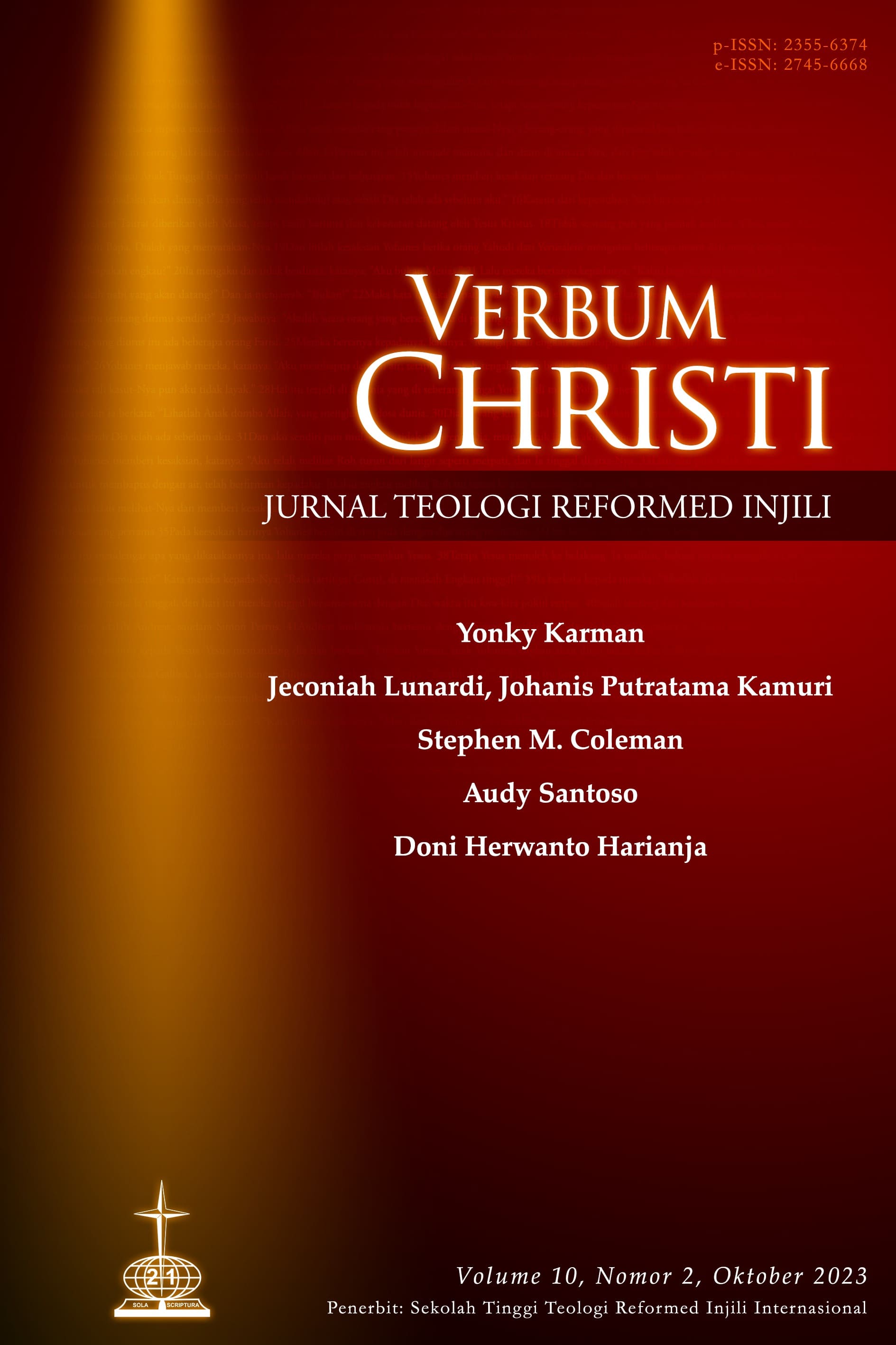"Dengarlah, Anakku dan Tinggallah Aman!"
Sebuah Analisis Retorik dari Amsal 1:8-33
DOI:
https://doi.org/10.51688/VC10.2.2023.art3Kata Kunci:
Amsal, analisis retorik, HikmatAbstrak
Meskipun kata-kata Hikmat dalam Amsal 1:20-33 mungkin disusun atau tidak sebagai puisi independen, fungsinya dalam struktur prolog melengkapi wacana awal (Amsal 1:8-19). Hikmat mengambil dan melanjutkan tiga tema utama dari instruksi ayah, khususnya gagasan tentang otoritas ilahi dari kebijaksanaan, sifat dan urgensi pengembangan karakter, dan realitas hubungan antara perbuatan dan konsekuensi. Secara keseluruhan, kedua wacana tersebut memiliki tujuan retorik yang sama: mereka dirancang untuk meyakinkan generasi muda yang menyimak tentang perlunya membentuk karakter sejak usia dini dengan mengindahkan kebijaksanaan dan instruksi orang tuanya.
Unduhan
Referensi
Ansberry, Christopher B. Be Wise, My Son, and Make My Heart Glad: An Exploration of the Courtly Nature of the Book of Proverbs. Berlin: de Gruyter, 2011.
Brown, William. Character in Crisis. Grand Rapids: Eerdmans, 1996.
Camp, Claudia. Wisdom and the Feminine in the Book of Proverbs. Decatur, GA: Almond Press, 1985.
Clifford, Richard J. Proverbs: A Commentary. Louisville, KY: Westminster John Knox, 1999.
Day, John., R. P. Gordon, and H. G. M. Williamson. Wisdom in Israel. Cambridge: CUP, 1995.
Day, Peggy. Gender and Difference in Ancient Israel. Minneapolis: Fortress, 1989.
Delitzsch, Franz. Biblical Commentary on the Proverbs of Solomon. Grand Rapids, MI: Eerdmans, 1950.
Dell, Katherine J. The Book of Proverbs in Social and Theological Context. Cambridge: CUP, 2006.
Dozeman, T.B. Old Testament Rhetorical Analysis. New York: Doubleday, 1992.
Fox, Michael V. Proverbs 1-9. New York: Doubleday, 2000.
Harris, Scott. Proverbs 1-9: A Study of Inner-Biblical Interpretation. Atlanta: Scholars Press, 1995.
House, Paul R. Beyond Form Criticism: Essays in Old Testament Library Criticism. Winona Lake, IN: Eisenbrauns, 1992.
Kennedy, George. New Testament Interpretation through Rhetorical Criticism. Chapel Hill, NC: University of North Carolina Press, 1984.
Kline, Meredith G. The Structure of Biblical Authority. Eugene, OR: Wipf and Stock, 1997.
Leeuwen, R. C. Van. The Book of Proverbs. Nashville: Abingdon, 1997.
Leeuwen, Raymond C. Van. "Liminality and Worldview in Proverbs 1-9." Semeia (1990): 111-44.
Lo, Alison. Job 28 as Rhetoric: An Analysis of Job 28 in the Context of Job 22-30. Leiden: Brill, 2003).
Loader, J.A., Proverbs 1–9, Historical Commentary on the Old Testament. Peeters:
Leuven, 2014.
Loader, James A. The Composition of the Book of Proverbs. Sheffield: JSOT Press, 1994.
McCann, J. Clinton. The Shape and Shaping of the Psalter. Sheffield: Sheffield Academic, 1993.
McKane, William. Proverbs. Philadelphia: Westminster, 1970.
Meynet, Roland. Rhetorical Analysis: An Introduction to Biblical Rhetoric. Sheffield: Sheffield Academic, 1998.
Miller, Patrick. “The Beginning of the Psalter.” In The Shape and Shaping of the Psalter, edited by J. Clinton McCann, 83-92. (JSOT Sup159; Sheffield: Sheffield Academic, 1993)
Murphy, Roland E. “Wisdom’s Song: Proverbs 1:20-33.” The Catholic Biblical Quarterly 48, no. 3 (1986): 456–60. https://www.jstor.org/stable/43717235.
Newsom, Carol. “Woman and the Discourse of Patriarchal Wisdom.” In Gender and Difference in Ancient Israel, ed. Peggy Day. Minneapolis: Fortress, 1989.
Perdue, Leo. Proverbs. Louisville: John Knox Press, 2000.
Porter, Stanley E., and Thomas H. Olbricht. The Rhetorical Analysis of Scripture: Essays from the 1995 London Conference. Sheffield: Sheffield Academic Press, 1997.
Schipper, Bernd U., and D. Andrew Teeter. Wisdom and Torah: The Reception of 'Torah' in the Wisdom Literature of the Second Temple Period. Leiden: Brill, 2013.
Schipper, Bernd U., Proverbs 1-15, translated by Stephen Germany. Hermeneia; Minneapolis: Fortress, 2019.
Toy, Crawford H. Proverbs. New York: Charles Scribner's, 1899.
Trible, Phyllis. Rhetorical Criticism: Context, Method, and the Book of Jonah. Minneapolis: Fortress, 1994.
von Rad, Gerhard. Wisdom in Israel. Nashville: Abingdon, 1972.
Waltke, Bruce K. The Book of Proverbs: Chapters 1-15. Grand Rapids, MI: Eerdmans, 2004.
Waltke, Bruce and James Houston. The Psalms as Christian Worship: A Historical Commentary. Grand Rapids: Eerdmans, 2010.
Weeks, Stuart. Early Israelite Wisdom. Oxford: OUP, 1999.
Weinfeld, Moshe. Deuteronomy and the Deuteronomic School. Oxford: Clarendon, 1972.
Whybray, R. N. Proverbs. Grand Rapids, MI: Eerdsmans, 1994.
Whybray, Roger N. The Intelectual Tradition in the Old Testament. Berlin: de Gruyter, 1974.
Zabán, Bálint Károly. The Pillar Functions of the Speeches of Wisdom: Proverbs 1:20-33, 8:1-36, and 9:1-6 in the Structural Framework of Proverbs 1-9. Berlin/Boston, MA: W. de Gruyter, 2012.
Zabán, Bálint Károly. “A Survey of Present Research on Proverbs 1-9.” Reformẚtus Szemle (2008): 605-633. https://www.ceeol.com/search/article-detail?id=808263.
Unduhan
Diterbitkan
Versi
- 2024-05-29 (2)
- 2023-11-20 (1)
Cara Mengutip
Terbitan
Bagian
Lisensi
Hak Cipta (c) 2023 Verbum Christi: Jurnal Teologi Reformed Injili

Artikel ini berlisensi Creative Commons Attribution-NonCommercial 4.0 International License.




